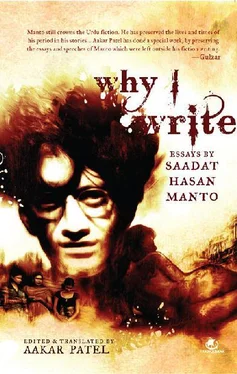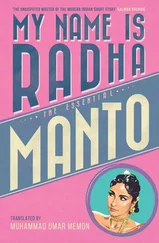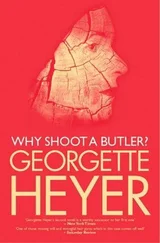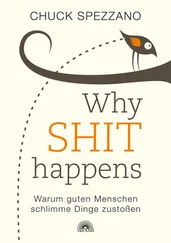It had cost me four rupees and fifteen annas. But apparently it’s “finders-keepers” in Pakistan, so I left my little girl’s ball with them for they had a right to it.
Another story about the neighbourhood. A man was removing the bricks from the path to our house. I went out and said: ‘Why are you doing this to us?’ He replied: ‘This is Pakistan — who are you to stop me?’ I had no reply to this either.
I had sent a radio for repairs and forgotten. When I remembered a month later, I went to pick it up. The man said: ‘I waited for you, and then I sold it to recover the cost of repairs.’
And recently, I got a notice from the government. ‘You’re an unwanted person,’ it read, ‘vacate the house that has been allotted to you as refugee property or tell us why we shouldn’t evict you from it.’
If I am now declared an “unwanted person”, the government perhaps also reserves the right to declare me a rat and exterminate me. Anyway, for now I’m safe here in Pakistan.
In the end I want to tell you this important story.
When I left Bombay at Partition, I first came to Karachi. Things were so nasty here that I immediately decided to flee to Lahore. I went to the railway station and asked for a first class ticket to Lahore.
The booking clerk said: ‘All the seats are booked, there’s no ticket for you.’
Now I was used to the environment of Bombay, where everything is available for a price. So I said ‘Look, why don’t you take something and give it to me.’
He stopped his work and looked at me. He said in a stern voice: ‘This is Pakistan. I would have done such a thing before, but now I cannot. All the seats are booked. You can’t get a ticket at any price.’
And I didn’t.
— (Originally published as Yom-e-Istiqlal in Oopar,
Neechay aur Darmiyan, 1954)
A Stroll Through the New Pakistan
What happens when the city you’re familiar with suddenly becomes a new country? Manto tells us by taking a walk through the lanes of Lahore, a city that was once in India and later became something else.
It was a strange season and a strange morning.
The thought kept coming to me: “Get out of the house. Go to the garden.” So I left.
On the way, I walked through bazaars and the neighbourhood. I had already seen most of these before, but yesterday for the first time saw what they had become after Pakistan became “Zindabad”.
“Pakistan Zindabad — Mohajir Haircutting Saloon”; “Pakistan Zindabad — We Fix Locks”; “Pakistan Zindabad — Garam Chai Stall”; “Pakistan Zindabad — Hospital for Sick Pets”; “Pakistan Zindabad — This shop has been allotted to Syed Anwer Husain Mohajir from Jalandhar”. And so on.
Outside a building I even saw this: “Pakistan Zindabad — This property belongs to a Parsi”. Meaning don’t allot it by mistake thinking it to be a Hindu’s.
It was a strange season and a strange morning. Almost all the shops were shut. A halwai was open. I thought a glass of lassi would be refreshing. In the shop I noticed that the fan was on, but turned away from both customers and the owner.
I was curious and asked why it was so. The owner glared at me and said: ‘Can’t you see?’
I looked. The fan was pointed in the direction of a poster of our great leader, Muhammad Ali Jinnah.
I shouted, ‘Pakistan Zindabad!’ and left without the lassi.
In front of a shop, a man sat frying pooris. I thought I had bought chappals from the same shop just a couple of days ago. Where did that go? It was the same board, and in front was the same building gutted in the riots, in whose balcony hung a fan. I wondered if it had fanned the flames.
‘What are you thinking about?’ the pooriwala said from behind me, ‘They’re fresh and hot!’
I said: ‘I’m thinking — wasn’t there a shoe shop where you’re sitting?’
He wiped the sweat off his brow and smiled. ‘It’s still here. It opens at 9. I open at 6 and am done by 8:30.’
I moved on. I saw a man bent over some shards of glass on the road. At first I thought he was a good man, picking out larger pieces which he worried would trouble pedestrians.
But it then became clear that he was actually scattering them around thoughtfully here and there. I stood at a distance to figure out why.
Once he was done, he walked to the side of the road under a board that read: “Cycle puncture and repair shop”. I walked faster. There was one nice change to the boards of the shops. Earlier almost all used to be in English. Now their names and descriptions were in Urdu. Some had Arabic names and some were in Persian. When in Rome, as they say…. One shoe shop was called Paposhiana, probably meaning an ashiana (nest) for shoes.
I was pleased. I shouted, ‘Pakistan Zindabad!’ and moved on.
Next I saw a strange cart erected on four cycle wheels. I asked what it was. ‘Hotel,’ I was informed. A travelling hotel. There was a stove and pan for chapattis, four gravy dishes were ready, a pan to fry shami kababs, two pots of water, ice, bottles of lemonade, a pot of curds, glasses, plates. All of it. Amazing.
A little ahead, a man was slapping a boy around. On asking why, I was told the child was a servant who had lost a one-rupee note.
I confronted the man: ‘What’s the matter with you? He’s only a child. A one-rupee note is really a scrap of paper. He must have dropped it somewhere. Don’t you dare hit him for it.’
The man didn’t back down. ‘It may be a scrap of paper for you. Do you know how much effort is put in to earn one of those?’ Saying this, he once again began to thrash the boy.
I couldn’t stand it any longer. I fished out a rupee from my pocket and gave it to the man.
I walked on. A few paces later, a fellow put his hand on my shoulder. He was smiling. ‘You gave a rupee to that bastard, didn’t you?’
‘Yes,’ I said, ‘he was hitting the poor child.’
‘The poor child is his son,’ the man said.
‘What?’
‘They collect a few rupees this way every day.’
‘Fine,’ I said and walked on.
Ahead, there was chaos. Some boys with bundles of paper were shouting and running about. I heard many accents and languages. They were selling newspapers and shouting out the latest headlines. A shoe had been flung in Delhi; dogs had attacked a leader’s house in Lucknow; Kashmir would be liberated in two weeks.
There were many papers. There was Nawa-e-Subah , there was Abu-al-Waqt , and Sunehra Pakistan.
I noticed a woman there. She was about fifty and serious-faced. She had a cloth bag in one hand and a bundle of newspapers in the other.
‘Are you selling those?’ I asked.
‘Yes.’
I bought two and moved on, thinking about her.
A pack of dogs began running towards me. Snarling, sniping, loving and biting each other at the same time. I stood to the side, frozen in fear. Only a couple of weeks ago I had been bitten and injected fourteen times in my stomach with 10 cc shots. I wondered if the dogs were refugees from the other side or had been left behind when their masters went over. Whatever it was, I felt, they should be cared for. Those belonging to refugees should be rehabilitated. Those who were master-less should be allotted to Pakistanis who had left their dogs behind. The pack then moved on and I calmed down.
I began to walk again, opening one of the newspapers. There was a large photograph of an actress inside, printed in three colours. She was wearing little. The caption read: “See how obscene the movies have become”. I said ‘Pakistan Zindabad’ in my head and tossed the paper onto the street. In the second paper, I spotted this little classified, “Yesterday, I left my cycle outside Lloyd’s Bank. On returning, I found my new saddle replaced by a broken, old one. I’m a poor refugee. Whoever took it, please return my saddle.”
Читать дальше












